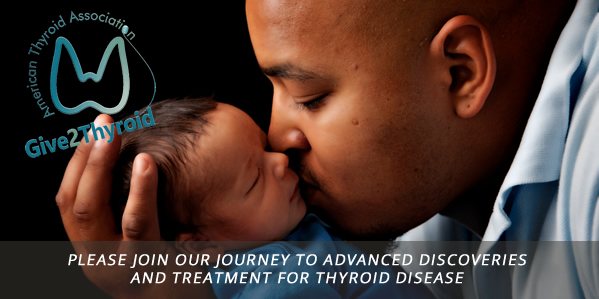Clinical Thyroidology for the Public summarizes selected research studies discussed in the previous month’s issue of Clinical Thyroidology, an official publication of the American Thyroid Association. Editor-in-chief, Alan Farwell, MD, FACE
Volume 11 Issue 12
Available in pdf format for saving and printing and Web page format for viewing online
PDF Format for Saving and Printing
Clinical Thyroidology for the Public Volume 11 Issue 12 (PDF file, 5.75 MB)
TABLE OF CONTENTS – Web Format
TABLE OF CONTENTS – Web Format
THYROID FUNCTION TESTS Biotin supplement use is common and can lead to the false measurement of thyroid hormone in commonly used assays
Biotin is often taken as a supplement for a variety of proposed health benefits. There are numerous reports of biotin interference with laboratory testing, specifically with thyroid function tests. This study reports the use of multivitamins and biotin supplements by outpatients in Rochester, Minnesota, and also reports plasma biotin levels in patients seen in the Mayo Clinic emergency department.
Katzman BM et al 2018 Prevalence of biotin supplement usage in outpatients and plasma biotin concentrations in patients presenting to the emergency department. Clin Biochem. Epub 2018 Jul 20. PMID: 30036510.
(PDF File for saving and printing, 806 KB)
THYROID AND PREGNANCY Higher iodine intake in the mother during pregnancy is associated with higher child IQ
Iodine is a nutrient required to make thyroid hormones which is essential for brain development in the baby during pregnancy. Very low levels of iodine in the mother during pregnancy have been associated with subsequent decreased child IQ and school performance. This study examines the relationship between iodine status in the mother before pregnancy and the subsequent brain function of the child.
Robinson SM et al. Preconception maternal iodine status is positively associated with IQ but not with measures of executive function in childhood. J Nutr 2018; 148:959–966. PMID: 29767745.
(PDF File for saving and printing, 657 KB)
THYROID FUNCTION TESTS TSH alone would be a sufficient screening test for thyroid hormone abnormalities
There are different recommendations on how to screen for thyroid problems. In a one-step approach, both TSH and FT4 are measured initially. Alternatively, TSH is measured first, then FT4 is measured only if TSH is abnormal in a two-step approach. The present study was done to determine the best approach to screen and whether there is a clinical risk score that can be used to predictor risk of developing thyroid problems.
Schneider C et al 2018 Initial evaluation of thyroid dysfunction—are simultaneous TSH and fT4 tests necessary? PLoS One 13:e0196631.PMID: 29709030.
(PDF File for saving and printing, 619 KB)
HYPOTHYROIDISM Appropriate treatment with thyroid hormone can decrease the excess death associated with hypothyroidism
Hypothyroidism causes a wide range of problems in the body. Several studies tried to determine the risk of death in patients with hypothyroidism but the results are mixed. This study aimed to investigate the risk of death in patients with hypothyroidism as well as examining the effects of over- and under-treatment of hypothyroidism with thyroid hormone.
Lillevang-Johansen M et al 2018 Over- and undertreatment of hypothyroidism is associated with excess mortality: a register-based cohort study. Thyroid 28:566–574. Epub 2018 Apr 26. PMID: 29631518.
(PDF File for saving and printing, 617 KB)
THYROID CANCER Different thyroid cancer descriptions impact patient anxiety and treatment choices
Many cases of very small papillary thyroid cancers are not clinically meaningful and, thus, may not even need to be treated. Indeed, some physicians are now offering the chance to have the thyroid cancer be monitored, rather than having the cancer removed by surgery. This was study was to see how describing the papillary thyroid cancer in other terms might lead to less patient worry and therefore allow greater use of active surveillance of this low-risk cancer.
Nickel B et al Effect of a change in papillary thyroid cancer terminology on anxiety levels and treatment preferences: A randomized crossover trial. JAMA Otolaryngol Head Neck Surg. 2018 Oct 1;144(10):867-874.
(PDF File for saving and printing, 773 KB)
THYROID NODULES Can analysis of a small panel of genetic mutations on samples from thyroid biopsies help us to decide which nodules should be removed?
Further testing has been proposed to categorize indeterminate nodules into low risk or high risk for cancer. While several commercially available panels test for a wide range of mutations, the 3 most common mutations associated with aggressive thyroid cancer are BRAF, RAS and TERT. This study evaluated whether analyzing the presence of a limited set of these known mutations could predict which nodules required surgery.
Macerola E et al 2018 The mutational analysis in the diagnostic work-up of thyroid nodules: the real impact in a center with large experience in thyroid cytopathology. J Endocrinol Invest. Epub 2018 Apr 27. PMID: 29704233.
(PDF File for saving and printing, 620 KB)




